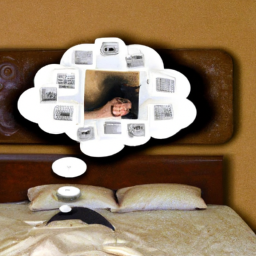Dreams are meaningful experiences shaped by your subconscious, not just random mental noise. They reflect your emotions, fears, and desires through symbols and themes that often carry important messages. Scientific studies show that brain activity during REM sleep helps process feelings and memories, suggesting dreams serve a purpose. If you keep exploring, you’ll discover how understanding these signals can offer valuable insights into your inner life.
Key Takeaways
- Dreams often contain symbolic messages from the subconscious, indicating they are meaningful rather than random.
- Scientific studies show brain activity during REM sleep processes emotions and memories, supporting the idea that dreams serve a purpose.
- Recurring symbols and themes in dreams suggest they communicate internal thoughts and unresolved issues.
- Interpreting dream symbols can provide valuable insights into our feelings, fears, and desires.
- Overall, evidence indicates dreams are a purposeful reflection of the inner self, not just random mental noise.

Have you ever wondered if your dreams carry any real meaning? Many people do, especially when they wake up feeling puzzled or intrigued by the images and stories that played out overnight. The idea that dreams are more than random mental noise has persisted for centuries, prompting questions about whether they serve a purpose or are simply the brain’s way of processing information. When you look into dream symbolism, you start to see how certain symbols and themes can recur, hinting at deeper layers of your subconscious messaging. Instead of dismissing dreams as meaningless, you might begin to see them as a form of communication from your inner self—an internal dialogue that reveals your hidden fears, desires, or unresolved conflicts.
Dreams reveal hidden fears, desires, and messages from your subconscious—unlock their meaning for self-discovery.
Dream symbolism is central to understanding whether dreams have inherent meaning. For example, dreaming about water might symbolize emotions or the flow of your feelings, while being chased could reflect anxiety or avoidance in your waking life. These symbols aren’t random; they’re often rooted in your subconscious messaging, which your mind uses to communicate complex feelings that you might not be fully aware of during your waking hours. By paying attention to these symbols and the emotions they evoke, you can start to decode what your dreams might be trying to tell you. It’s like a secret language, where each image and scenario has a specific meaning that, when interpreted correctly, offers insight into your inner world.
This perspective suggests that dreams serve a purpose beyond mere random firing of neurons. Instead, they act as a mirror reflecting your subconscious thoughts and feelings. Your mind may use dream symbolism to work through unresolved issues or to highlight aspects of yourself that need attention. The messages aren’t always straightforward, and sometimes they’re symbolic or metaphorical, requiring interpretation. Scientific research supports the idea that brain activity during REM sleep plays a role in processing emotions and consolidating memories, reinforcing the notion that dreams are meaningful. But the fact that your brain generates these images with purpose indicates that dreams could be a form of subconscious messaging, guiding you to understand yourself better. Whether or not you believe every dream carries a specific meaning, it’s undeniable that many dreams seem to resonate with your inner life, hinting at truths that your conscious mind might overlook.
In the end, whether dreams are meaningful or just random firing doesn’t matter as much as how you choose to interpret them. Recognizing the potential for dream symbolism to reveal subconscious messaging can transform how you view your nightly visions. Instead of dismissing dreams as meaningless, you can approach them as a valuable tool for self-discovery. By paying closer attention to the symbols and themes that appear, you might unveil insights that help you navigate your waking life more clearly and confidently. After all, your dreams could be trying to tell you something important—if only you’re willing to listen.
Frequently Asked Questions
Can Dreams Predict Future Events Accurately?
Dreams can sometimes predict future events, especially if you’re practicing lucid dreaming, where you’re aware and can influence your dreams. By understanding dream symbolism, you might notice clues or patterns that hint at upcoming situations. However, not all dreams are accurate predictors; many are just reflections of your subconscious thoughts. Stay attentive to your dreams, and you could uncover insights, but don’t rely on them as infallible forecasts.
Are Nightmares a Sign of Underlying Mental Health Issues?
Nightmares can indeed be a sign of underlying mental health issues, acting as powerful symbols from your subconscious. They often carry deep sleep symbolism, revealing hidden fears or unresolved conflicts. These vivid, intense dreams aren’t just random images—they’re messages begging to be understood. If nightmares become frequent or overwhelming, it’s a clear sign you should pay attention to your mental well-being, as they reflect your inner emotional landscape.
Do Recurring Dreams Have Specific Psychological Meanings?
Recurring dreams often have specific psychological meanings, serving as symbolic representations of unresolved issues or emotional processing. You might notice patterns that reveal subconscious concerns, fears, or desires. These dreams encourage you to confront underlying emotions, helping you understand yourself better. Paying attention to recurring themes can provide valuable insights into your mental state, guiding you toward personal growth and emotional healing.
How Do Cultural Beliefs Influence Dream Interpretation?
You’re really on the ball when it comes to understanding how cultural beliefs shape dream interpretation. Culture acts as a lens through which you view symbols, with cultural symbolism deeply rooted in belief systems. These influence whether you see a dream as a warning, blessing, or mere coincidence. Your cultural background colors your perception, guiding you to interpret dreams in a way that aligns with your worldview, making dreams more meaningful or just a random flicker.
Is There a Scientific Method to Analyze Dream Content?
Yes, there is a scientific method to analyze dream content through sleep analysis and examining dream symbolism. Researchers use techniques like polysomnography to monitor brain activity during sleep, while dream reports are analyzed for recurring themes and symbols. This approach helps identify patterns and potential meanings behind dreams. By understanding these symbols and sleep stages, you can gain insights into your subconscious mind, making dream analysis a valuable scientific tool.
Conclusion
Dreams are like whispers from your subconscious, hinting at feelings or thoughts you might not even realize you have. While some see them as random, others believe they’re messages guiding you through life’s maze. Whether they’re meaningful or just noise, they’re a mirror reflecting your inner world. So, next time you wake up from a vivid dream, remember—your mind might just be trying to tell you something important, hidden in the shadows of your sleep.









